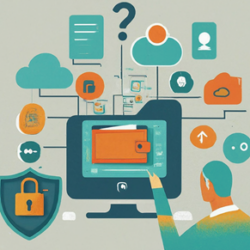Bits and Bytes in Your Digital Wallet: The Smart Things to Do
September 2024

In today’s digital age, securing your financial plan is crucial to avoiding unnecessary losses, fees, and taxes. Many people recognize the importance of estate planning, yet often overlook the need to include digital assets. These digital assets hold significant value and, if not properly managed, can lead to complications. Here’s why you should include digital assets in your estate plan and how to ensure secure access to them.
Automatic Payments
Imagine this scenario: a loved one passes away, but their automatic payments for gym memberships, cellphone bills, insurance premiums, and utilities continue to be deducted from their bank account. This is a common issue as the average person has about 25 online accounts, many of which use automatic debiting. These payments do not necessarily stop upon the account holder’s death, potentially draining the remaining funds. A “digital fiduciary” with the right login and password could correct this situation, but without proper planning, these accounts may continue to incur charges, creating unnecessary financial burdens.
Email Accounts
Internet service providers often refuse to disclose usernames and passwords to appointed executors or successor trustees, even those formally identified in an estate plan. Important notifications and correspondences in email accounts can remain unread and unanswered if access is not properly arranged. Instructing that your email account remain open for several months or passing login information to the responsible person in your estate plan can help manage these crucial communications.
Digital Fiduciary
Appointing a “digital fiduciary” in your estate plan will manage your digital accounts and assets. Although naming someone in your estate documents doesn’t guarantee that websites will honor this designation, it’s a vital step toward securing your digital legacy. Informing this person of their responsibilities well in advance is crucial, especially since current laws offer little support for executors handling digital matters.
To further safeguard your digital assets, use a digital password vault instead of memorizing logins or keeping them on sticky notes. Many apps are available for free or at a low cost, such as LastPass and 1Password. You can assign access to this vault to your digital fiduciary in your trust documents, ensuring they have the information needed to manage your digital legacy effectively.
Photographs
Treasured family photos may only exist online in digital format, and access to them may be important to future generations. Ensuring these digital memories are accessible to your loved ones is a crucial part of your digital legacy.
The Expanding Definition of Assets
Traditionally, estate planning focused on tangible assets like real estate, stocks, and personal belongings. However, today’s landscape includes a vast array of digital properties:
- Cryptocurrencies and NFTs: These digital currencies and assets can hold substantial financial value.
- Online Banking and Investment Accounts: Access to these accounts is vital for managing and distributing financial resources.
- Social Media Profiles: Platforms like Facebook, Instagram, and LinkedIn contain personal memories and connections that loved ones might want to preserve.
- Email Accounts: Important personal and professional correspondence is often stored in email accounts.
- Digital Subscriptions and Services: From streaming services to cloud storage, these accounts may have recurring payments or hold valuable content.
Investment News recently reported that our increasing shift to digital data storage and Internet usage means we now own valuable assets that “live” only on disc drives, the web, and clouds. As Darla Mercado wrote, “These could be photos that are stored on a website, social media profiles, PDF documents, e-mails and other types of intellectual property. Web-centric businesses – for example, an eBay storefront or a PayPal account – also carry monetary value.”
When you ascend to the clouds, your YouTube or iTunes this content doesn’t go with you. In fact, the content remains grounded, locked up in your account and unable to be passed on. While some digital assets can be bequeathed to specific individuals, and accounts like these can be recreated at some point to create a new account with access for additional parties, the smart move is to get all your digital assets and designated executors identified in a will or trust document.
The Role of Professional Guidance
Navigating the complexities of digital asset management in estate planning can be daunting. Consulting with us as your financial fiduciary advisor and estate planning attorneys, can provide clarity and ensure your digital legacy is protected.
Conclusion
Don’t let your legacy get lost in cyberspace—take the necessary steps today to protect your digital assets. As we continue to integrate more of our lives into the digital realm, it becomes increasingly important to consider these assets in our estate planning. By securing your digital future, you not only preserve your legacy but also provide peace of mind to your loved ones.




